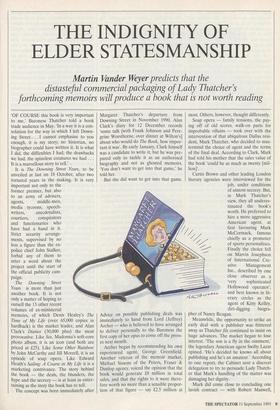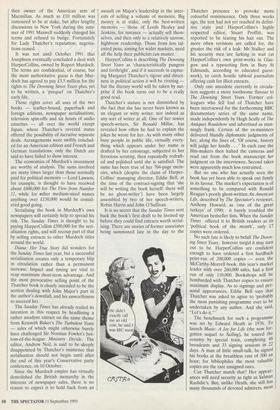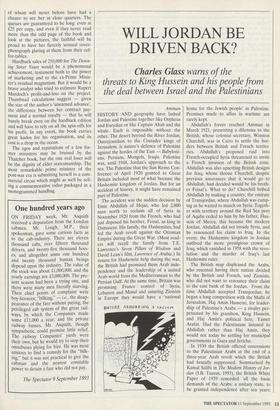THE INDIGNITY OF ELDER STATESMANSHIP
Martin Vander Weyer predicts that the
distasteful commercial packaging of Lady Thatcher's forthcoming memoirs will produce a book that is not worth reading
`OF COURSE this book is very important to me,' Baroness Thatcher told a book trade audience in May. 'In a way it is a con- solation for the way in which I left Down- ing Street . . . I cannot emphasise to you enough, it is my story; no historian, no biographer could have written it. It is what I did, the difficulties I had, the drawbacks we had, the spineless creatures we had . . . It is a marvellous story to tell.' ■ agents, middle-men, media tycoons, speech- writers, anecdotalists, courtiers, conspirators and functionaries who have had a hand in it. Strict security arrange- ments, supervised by no less a figure than the ex- police chief John Stalker, forbid any of them to utter a word about the project until the start of the official publicity cam- paign.
The Downing Street Years is more than just another book. It is not only a matter of hoping to outsell the 13 other recent volumes of ex-ministerial memoirs, of which Denis Healey's The Time of My Life (over 65,000 copies in hardback) is the market leader, and Alan Clark's Diaries (30,000 plus) the most provocative. Like Sex, Madonna's soft-core photo album, it is an icon (and both are priced at £25). Like Some Other Rainbow by John McCarthy and Jill Morrell, it is an episode of soap opera. Like Edward Heath's Sailing: A Course in My Life it is a marketing contrivance. The story behind the book — the deals, the blunders, the hype and the secrecy — is at least as enter- taining as the story the book has to tell.
The concept was born immediately after
Margaret Thatcher's departure from Downing Street in November 1990. Alan Clark's diary for 12 December records `some talk [with Frank Johnson and Pere- grine Worsthorne, over dinner at Wilton's] about who would do The Book, how impor- tant it was'. By early January, Clark himself was a candidate to write it, but he was pre- pared only to tackle it as an authorised biography and not as ghosted memoirs. `You don't want to get into that game,' he told her.
But she did want to get into that game.
Advice on possible publishing deals was immediately to hand from Lord (Jeffrey) Archer — who is believed to have arranged to deliver personally to the Baroness the first copy of her opus to come off the press- es next month.
Archer began by recommending his own experienced agent, George Greenfield. Another veteran of the memoir market, Michael Sissons of the Peters, Fraser & Dunlop agency, voiced the opinion that the book would generate £8 million in total sales, and that the rights to it were there- fore worth no more than a sensible propor- tion of that figure — say £2.5 million at most. Others, however, thought differently.
Soap opera — family tensions, the pay- ing off of old scores, walk-on parts for improbable villains — took over with the intervention of that ubiquitous Dallas resi- dent, Mark Thatcher, who decided to mas- termind the choice of agent and the terms of the final deal. According to Clark, Mark had told his mother that the sales value of the book 'could be as much as twenty [mil- lion]'.
Meanwhile, the opportunity to strike an early deal with a publisher was frittered away as Thatcher fits continued to insist on huge advances. The market began to lose interest. 'The son is a fly in the ointment,' the legendary American agent Swifty Lazar opined. 'He's decided he knows all about publishing and he's an amateur.' According to one report, the Cabinet sent a discreet delegation to try to persuade Lady Thatch- er that Mark's handling of the matter was damaging her dignity.
Mark did come close to concluding one lavish contract — with Robert Maxwell, then owner of the American arm of Macmillan. As much as £10 million was rumoured to be at stake, but after lengthy discussions in New York during the sum- mer of 1991 Maxwell suddenly changed his terms and refused to budge. Fortunately for Lady Thatcher's reputation, negotia- tions ceased.
It was not until October 1991 that Josephson eventually concluded a deal with HarperCollins, owned by Rupert Murdoch. The terms are confidential, of course, but the most authoritative guess is that Mur- doch has agreed to pay £3.5 million for the rights to The Downing Street Years plus, yet to be written, a 'prequel' on Thatcher's early life.
Those rights cover all uses of the two books — leather-bound, paperback and foreign editions, newspaper serialisations, television spin-offs and six hours of audio cassettes — all over the world except Japan, where Thatcher's revered status offered the possibility of lucrative separate deals. Arrangements were swiftly conclud- ed for an American edition and French and German translations; only the Dutch are said to have failed to s'how interest.
The economics of Murdoch's investment are worthy of analysis. The sums involved are many times larger than those normally paid for political memoirs — Lord Lawson, for example, is thought to have received about £600,000 for The View from Number 11, while for other medium-sized names anything over £150,000 would be consid- ered good going.
Serialising the book in Murdoch's own newspapers will certainly help to spread his risk. The Sunday Times is thought to be paying HarperCollink £500,000 for the seri- alisation rights, and will recoup part of that by selling extracts to other Murdoch titles around the world.
Diana: Her True Story did wonders for the Sunday Times last year, but a successful serialisation creates only a temporary blip in circulation rather than a permanent increase. Impact and timing are vital to reap maximum short-term advantage. And the most provocative selling point of the Thatcher book is clearly intended to be the section dealing with John Major's part in the author's downfall, and his unworthiness to succeed her.
The Sunday Times has already trailed its intention in this respect by headlining a rather anodyne extract on the same theme from Kenneth Baker's The Turbulent Years — sales of which might otherwise barely have challenged Sir Norman Fowler's bot- tom-of-the-league Ministers Decide. The editor, Andrew Neil, is said to be deeply disappointed by Thatcher's insistence that serialisation should not begin until after the end of this year's Conservative party conference, on 10 October.
Since the Murdoch empire has virtually demolished the British monarchy in the interests of newspaper sales, there is no reason to expect it to hold back from an
assault on Major's leadership in the inter- ests of selling a volume of memoirs. Big money is at stake; only the best-written memoirs — those of Lords Healey and Jenkins, for instance — actually sell them- selves, and then only to a relatively narrow, highbrow readership. Those from less tal- ented pens, aiming for wider markets, need all the help their publicists can muster.
HarperCollins is describing The Downing Street Years as 'characteristically pungent and forthright', and if it succeeds in captur- ing Margaret Thatcher's vigour and direct- ness in political action it will be riveting but the literary world will be taken by sur- prise if the book turns out to be a really good read.
Thatcher's stature is not diminished by the fact that she has never been known as an elegant or witty writer, nor indeed as any sort of writer at all. One of her senior speech-writers, Sir Ronald Millar, has revealed how often he had to explain the jokes he wrote for her. As with many other busy people in public life, virtually every- thing which appears under her name is drafted by her entourage, subjected to her ferocious scrutiny, then repeatedly redraft- ed and po.lished until she is satisfied. The same has been true of her 704-page mem- oirs, which (despite the claim of Harper- Collins' managing director, Eddie Bell, at the time of the contract-signing that 'she will be writing the book herself: there will be no ghost-writer') have been largely assembled by two of her speech-writers, Robin Harris and John O'Sullivan.
It is no secret that the Sunday Times sent back the book's first draft to be livened up before they could find extracts worth serial- ising. There are stories of former associates being summoned late in the day to the Thatcher presence to provoke more colourful reminiscence. Only three weeks ago, the text had not yet reached its defini- tive state and HarperCollins's highly respected editor, Stuart Proffitt, was reported to be tearing his hair out. The more often revisions are called for, the greater the risk of a leak: Mr Stalker and his security men are lurking in wait (at HarperCollins's own print-works in Glas- gow and a typesetting firm in Bury St Edmunds, according to educated guess- work), to catch hostile tabloid journalists offering cash for illicit extracts.
Only one anecdote currently in circula- tion suggests a more toothsome flavour to The Downing Street Years. Former col- leagues who fell foul of Thatcher have been interviewed for the forthcoming BBC documentary series of the same name, made independently by Hugh Scully of The Antiques Roadshow and advertised as stun- ningly frank. Certain of the ex-ministers delivered blandly diplomatic judgments of her, along the lines of, 'Of course, history will judge her kindly . . . ' In each case the film-makers then halted the cameras and read out from the book manuscript her judgment on the interviewee. Second takes were apparently much less restrained.
But no one who has actually seen the book has yet been able to speak out firmly in its favour. The market's expectation is of something to be compared with Ronald Reagan's poorly ghost-written An American Life, described by The Spectator's reviewer, Anthony Howard, as 'one of the great turkeys' of 1990; it barely troubled the American bestseller lists. When the Sunday Times offered it to British readers as its `political book of the month', only 17 copies were ordered.
No such fate is likely to befall The Down- ing Street Years, however turgid it may turn out to be. HarperCollins are confident enough to have ordered a first hardback print-run of 200,000 copies — even the McCarthy-Morrell book, this year's market leader with over 260,000 sales, had a first run of only 110,000. Bookshops will be bombarded with Thatcher copies to ensure maximum display. As to signings and per- sonal appearances, Eddie Bell says that Thatcher was asked to agree to 'probably the most punishing programme ever to be undertaken by any author. And she said, "Let's do it." ' The benchmark for such a programme was set by Edward Heath in 1976. To launch Music: A Joy for Life (the now for- gotten sequel to Sailing), he toured the country by special train, completing 48 broadcasts and 33 signing sessions in 22 days. A man of little small-talk, he signed his books at the breathless rate of 300 an hour; for bibliophiles the most valuable copies are the rare unsigned ones.
Can Thatcher match that? Her appear- ances will need security as tight as Salman Rushdie's. But, unlike Heath, she still has many thousands of devoted admirers, most
of whom will never before have had a chance to see her at close quarters. The queues are guaranteed to be long: even at £25 per copy, and even if they never read more than the odd page of the book and look at the pictures, the faithful will be proud to have her fiercely sensual cover- photograph glaring at them from their cof- fee-tables.
Hardback sales of 250,000 for The Down- ing Street Years would be a phenomenal achievement, testament both to the power of marketing and to the ex-Prime Minis- ter's residual magnetism. But it would be a brave analyst who tried to estimate Rupert Murdoch's profit-and-loss on the project. Thumbnail calculations suggest — given the size of the author's 'unearned advance', the difference between her contract pay- ment and a normal royalty — that he will barely break even on the hardback edition and will have to rely on all the spin-offs for his profit. In any event, the book carries great kudos for his organisation, and its cost is a drop in the ocean.
The egos and reputations of a few for- mer ministers may be bruised by the Thatcher book, but the one real loser will be the dignity of elder statesmanship. The most remarkable prime minister of the post-war era is submitting herself to a com- mercial circus which might as well be sell- ing a commemorative video packaged in a monogrammed handbag.




















































 Previous page
Previous page